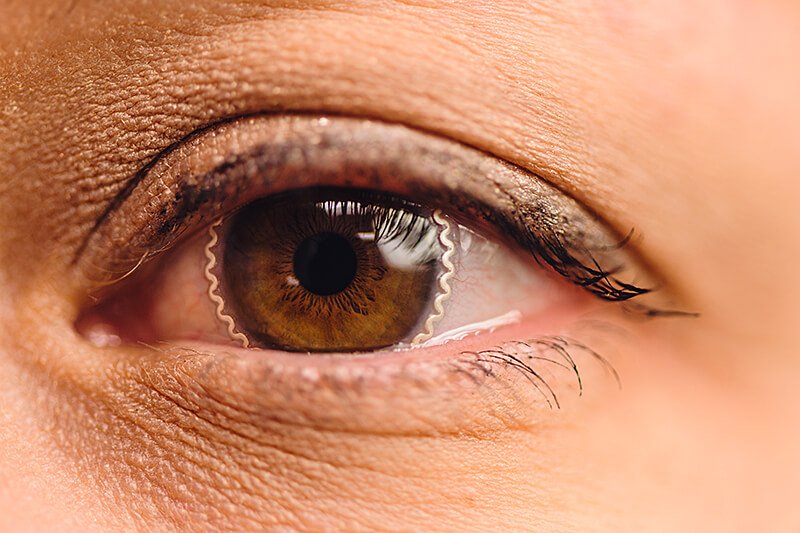
Research teams led by a faculty member in Purdue University’s College of Engineering will use two grants from the National Eye Institute totaling $6.7 million to further develop specialized smart soft contact lenses that continuously monitor or treat chronic ocular diseases like glaucoma, corneal neovascularization and dry eye syndromes. The research teams include Dr. Shin Ae Park, assistant professor of ophthalmology in the Purdue University College of Veterinary Medicine.
The teams are led by Dr. Chi Hwan Lee, the Leslie A. Geddes Associate Professor of Biomedical Engineering in Purdue’s Weldon School of Biomedical Engineering. He holds a joint appointment in the School of Mechanical Engineering and a courtesy appointment in the School of Materials Engineering. The research teams are developing patent-pending lenses, which can painlessly deliver therapeutic drugs or accurately measure intraocular pressure, or IOP. IOP is the only known modifiable risk factor for glaucoma.
In addition to Dr. Park, other researchers involved on the teams are Dr. Bryan Boudouris, Purdue’s associate vice president for research in strategic interdisciplinary research and the R. Norris and Eleanor Shreve Professor of Chemical Engineering in the Davidson School of Chemical Engineering; Dr. Pete Kollbaum, associate dean for research, director of the Borish Center for Ophthalmic Research and professor in Indiana University’s School of Optometry; and Dr. Yannis Paulus, associate professor of ophthalmology and visual sciences and biomedical engineering at Michigan Medicine.
Additional team members also included Dr. Jinyuan Zhang, a former Purdue postdoctoral student in biomedical engineering and now a health technologies research and development engineer at Apple, and Yumin Dai, a graduate student in the School of Materials Engineering.
“Working on smart soft contact lenses allowed us to engage in top-tier interdisciplinary research, moving beyond theory to craft real-world solutions that aim to transform eye disease treatment,” Dai said.
The National Eye Institute is one of the National Institutes of Health; the funding comes from the NIH Research Project Grant Program, or R01.
The innovation
Dr. Lee specializes in StickTronics, which are stickerlike items that contain electronics or smart technology. He develops wearable biomedical devices that continuously monitor and manage chronic diseases or health conditions unobtrusively.
Some traditional wearable tonometers — devices that measure pressure inside the eyes — are equipped with an integrated circuit chip. This increases contact lens thickness and stiffness compared with a typical commercial soft contact lens, in many cases causing discomfort for patients. The research team’s version is different.
“To address this unmet need, we developed a unique class of smart soft contact lenses built upon various commercial brands of soft contact lenses for continuous 24-hour IOP monitoring and potentially treatment, even during sleep at home,” Dr. Lee said. “Our smart soft contact lenses retain the intrinsic lens features of lens power, biocompatibility, softness, transparency, wettability, oxygen transmissibility and overnight wearability. Having all these features at the same time is crucial to the success of translating the smart soft contact lenses into ocular disease care, but these features are lacking in current devices.”
The NEI grants
Dr. Lee said the $6.7 million funding from the two NEI grants will further refine the smart soft contact lenses. Concurrently, clinical trials will be conducted in collaboration with Purdue’s College of Veterinary Medicine, the IU School of Optometry and Michigan Medicine to assess the lenses’ biosafety, usability, functionality, therapeutic effectiveness and durability.
“With the steadfast support from NEI, the successful completion of these projects will solidify our path toward introducing an innovative, closed-loop system for these smart contact lenses,” Dr. Lee said. “This system will enable simultaneous monitoring and drug delivery for a wide range of chronic ocular diseases.” Dr. Lee disclosed the smart soft contact lenses innovation to the Purdue Innovates Office of Technology Commercialization, which has applied for a patent from the U.S. Patent and Trademark Office to protect the intellectual property.
